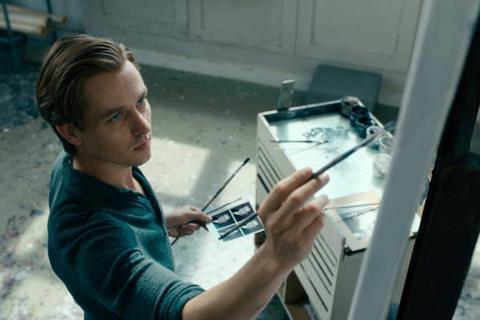A German artist is haunted by his childhood growing up in the shadow of the Nazis.

Dir/scr: Florian Henckel von Donnersmarck, Germany, 2018, 188 mins
Florian Henckel von Donnersmarck’s third feature (after the Oscar-winning The Lives Of Others and the far less well-recieved Hollywood feature The Tourist) sees the writer-director return to Germany, the fertile ground of his country’s post-war past, and to a degree of form. Never Look Away is an often moving, thoughtful drama about the correlations between personal experience, politics and art.
The Lives Of Others concerned a Stasi agent’s surveillance of two artists (a playwright and an actress) in East Berlin in the 1980s. The new film has a broader, though not dissimilar canvas, spanning the 1930s to 1960s. It follows a young protagonist - supposedly modelled on Gerhard Richter - from childhood in Nazi Germany, through student life in the Communist GDR and eventual realisation as an artist in West Germany. Picked up for US release prior to Venice by Sony Pictures Classics (which handled Lives), and already nominated as Germany’s Foreign Language Oscar submission, Never Look Away nonetheless carries a daunting three-hour running time as it embarks on its festival career with launches at Venice and Toronto.
The film opens in Dresden in 1937, and a pithily pointed scene in which the boy Kurt Barnard (Cai Cohrs) is taken by his aunt Elisabeth (an appealing Saskia Rosendahl) to the notorious Nazi exhibition of “degenerate art”, the party’s early salvo at anything that didn’t conform with its Aryan image, in particular the work of the European Modernists. Behind the back of the vile tour guide (a reliably repellent cameo by Lars Eidinger), the independently minded Elisabeth whispers her appreciation of a Kandinsky in the boy’s ear.
Kurt’s father has lost his teaching job because of his refusal to join the party and the family is struggling on the outskirts of the city. Elisabeth is the one most likely to inspire the youngster in his love of art, until she starts to suffer problems with her mental health. In keeping with the Nazi eugenics programme, and with the complicity of the Nazi-sympathising gynaecologist Professor Carl Seeband (Sebastian Koch), she will be hospitalised, sterilised, then sent to a gas chamber.
A powerful montage centred on the Dresden bombing piles on the boy’s personal losses; during the first years of Soviet occupation, these will be followed by his father’s tragic death. But the now young man (Tom Schilling) has a resilient nature, fuelled by his passion for painting. And at art school he falls in love with the fashion student Ellie (Paula Beer), their relationship quickly blossoming.
It is in Communist Dresden the drama is most effective, as Henckel von Donnersmarck constructs intriguing tensions on two fronts. As an artist, Kurt begrudging cedes his natural instinct, to find “truth” in art, to the propaganda demands of the Soviets; he may be a dab hand at a hammer and sickle, but his heart is not in it. At home, he’s unaware his new father-in-law, Seeband, is the war criminal responsible for his aunt’s death. Schilling and Beer make a touching romantic couple, and Koch (on the other side of the political divide in The Lives Of Others) is a persuasive monster, happy to be a “small cog” in whatever reactionary regime will have him.
The expectation of confrontation between the two men is never realised, however, nor is the impact of Kurt’s suffering and loss on his work. The final hour of the film sees the couple relocating to the West (just before the construction of the Wall), where Kurt enlists at art school in Dusseldorf and seeks to find his artistic voice. Here, the school’s professor is clearly modelled on Joseph Beuys (a riveting turn by Oliver Masucci, complete with a rendering of Beuys’ self-mythologising fabrication of his wartime experience) and Kurt’s discovery of photo-realism confirming the characterisation’s debt to Richter (who is thanked in the credits).
Cinematographer Caleb Deschanel and production designer Silke Buhr offer a seamless, unshowy transition across the decades and from East and West. Another Richter, Max, contributes a deeply affecting score.
Production companies: Pergamon Film, Wiedemann & Berg Film
International sales: Beta Cinema (beta@betacinema.com)
Producers: Florian Henckel von Donnersmarck, Jan Mojto, Quirin Berg, Max Wiedemann, Christiane Henckel von Donnersmarck
Screenplay: Florian Henckel von Donnersmarck
Production design: Silke Buhr
Editing: Patricia Rommel
Cinematography: Caleb Deschanel
Music: Max Richter
Cast: Tom Schilling, Sebastian Koch, Paula Beer, Oliver Masucci, Saskia Rosendahl, Ina Weisse, Lars Eidinger







![The Brightest SunScreen[Courtesy HKIFF]](https://d1nslcd7m2225b.cloudfront.net/Pictures/274x183/3/5/0/1448350_thebrightestsunscreencourtesyhkiff_312678.jpg)















![The Brightest SunScreen[Courtesy HKIFF]](https://d1nslcd7m2225b.cloudfront.net/Pictures/100x67/3/5/0/1448350_thebrightestsunscreencourtesyhkiff_312678.jpg)
